Like every other American institution, the United States military is struggling to deal with the spread of the novel coronavirus. Its immediate focus is on supporting civil authorities during this crisis while staying prepared for other missions. It is a complex and difficult balance to strike, and the virus is likely to take a serious long-term toll on readiness. Even after the crisis passes, things will never be the same for the military.
For now, a good portion of the military is supporting civilian efforts to counter the coronavirus pandemic, much of it undertaken by the reserve components. Last week, President Donald Trump used his authority under Title 32 of the U.S. code to activate the National Guards of California, New York and Washington, meaning the federal government will cover the costs while state governors retain operational control. They were later joined by Louisiana, New Jersey and Washington, D.C. Dozens of other requests for Title 32 status are expected to be approved soon, after Secretary of Defense Mark Esper last week created a conditional pre-authorization to allow quicker federal funding. All told, 50 states, the District of Columbia and the territories of Puerto Rico, Guam and the U.S. Virgin Islands have mobilized more than 16,000 troops from their Army and Air National Guard forces.
So far, the primary military effort has been to augment civilian medical capabilities through the construction of emergency field hospitals in New York’s Javits Center, Seattle’s CenturyLink Field and Detroit’s TCF Center, as well as through the deployment of hospital ships to New York and Los Angeles. The Defense Department also announced that it would provide respirator masks and ventilators from its own supplies, to be distributed by the Department of Health and Human Services.

